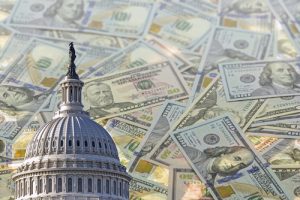
U.S. Rep. Tom Emmer (R-MN) requested that the Congressional Budget Office (CBO) update its recent report on pandemic-related federal spending to include the impact of additional spending made by Congress.
The CBO in September 2020 issued its report entitled “The Effects of Pandemic-Related Legislation on Output,” which analyzed the economic impact of the four spending bills Congress passed between March and April 2020, including the effect on gross domestic product (GDP), inflation, the debt, and deficits.
Since then, Congress has spent an additional $900 billion in December 2020 and $2 trillion in March 2021 in response to the ongoing pandemic, wrote Rep. Emmer and his colleague U.S. Rep. Patrick McHenry (R-NC) in an Aug. 19 letter sent to CBO Director Phillip Swagel.
“Moreover, Democrats are on the cusp of spending an additional five trillion, some of which will be paid for through higher taxes, but mostly financed through additional debt,” wrote the members, who both serve on the U.S. House Financial Services Committee.
“This massive spending spree will have short and long-term implications for the economy, including on GDP and inflation,” they wrote. “Recent data suggests the economy is slowing as prices continue to rise. Moreover, there continues to be a significant disconnect between employers and workers. We are concerned that massive new spending will only exacerbate this negative trend.”
Rep. Emmer and his colleague requested that the CBO update its September 2020 report to include the effects of the December 2020 and March spending, as well as a projection of the impact the $1.2 trillion Infrastructure Investment and Jobs Act and the $3.5 trillion in new spending associated with reconciliation will have on the nation’s economy.
“The report should include the impact on consumer prices, employment, wages, and overall economic conditions,” they wrote.



